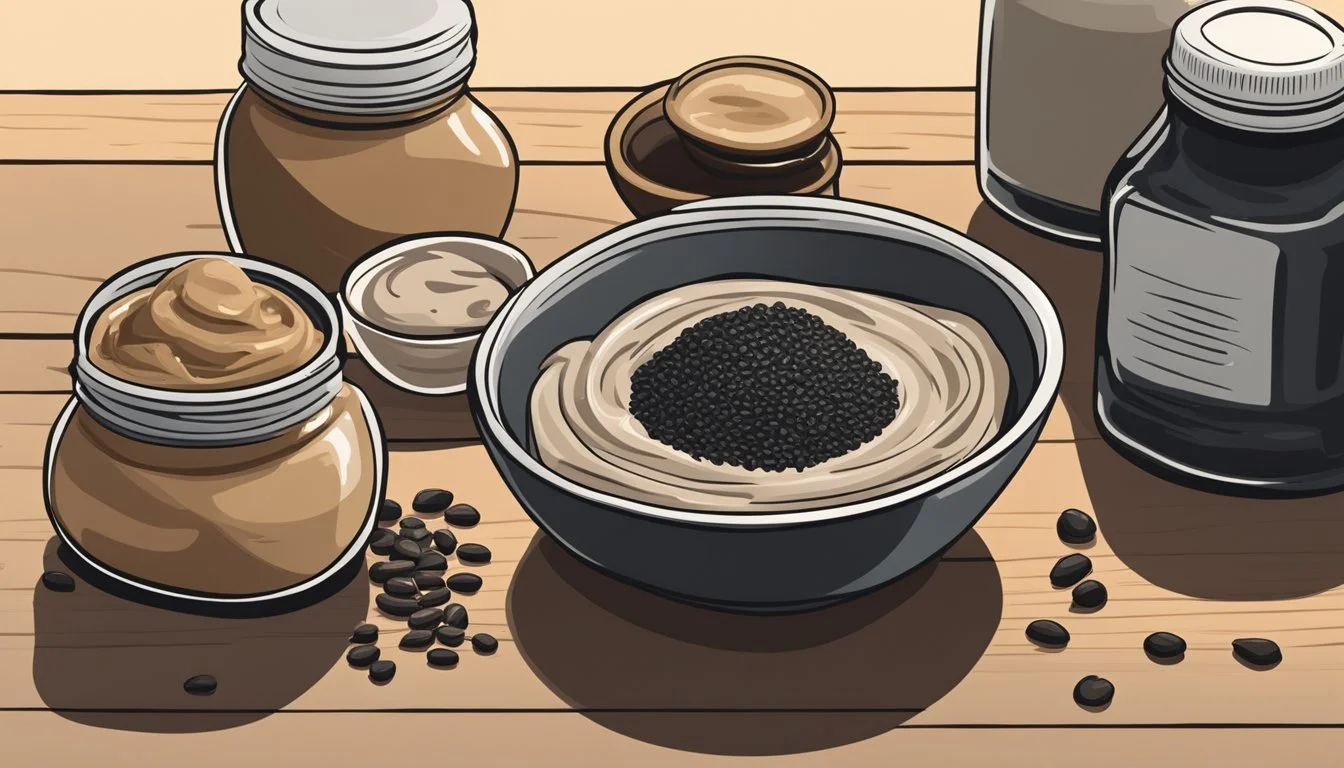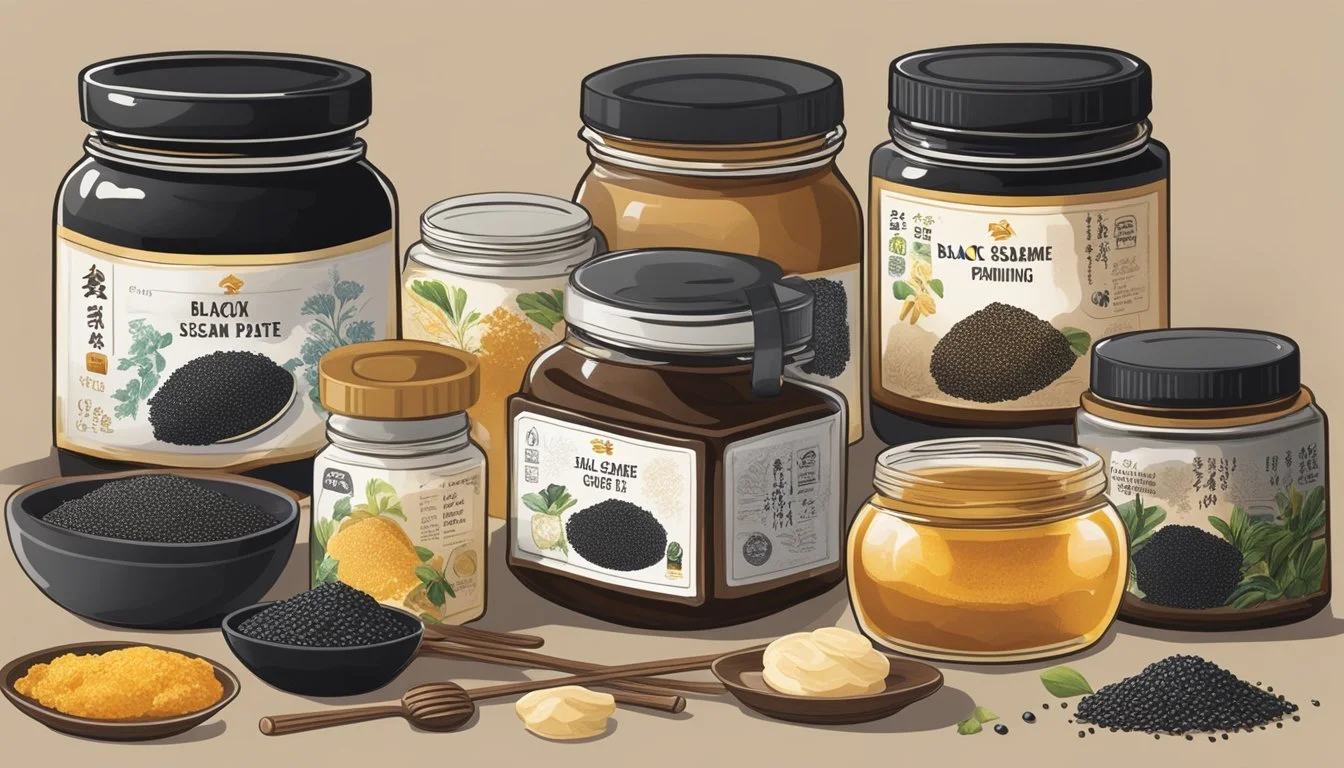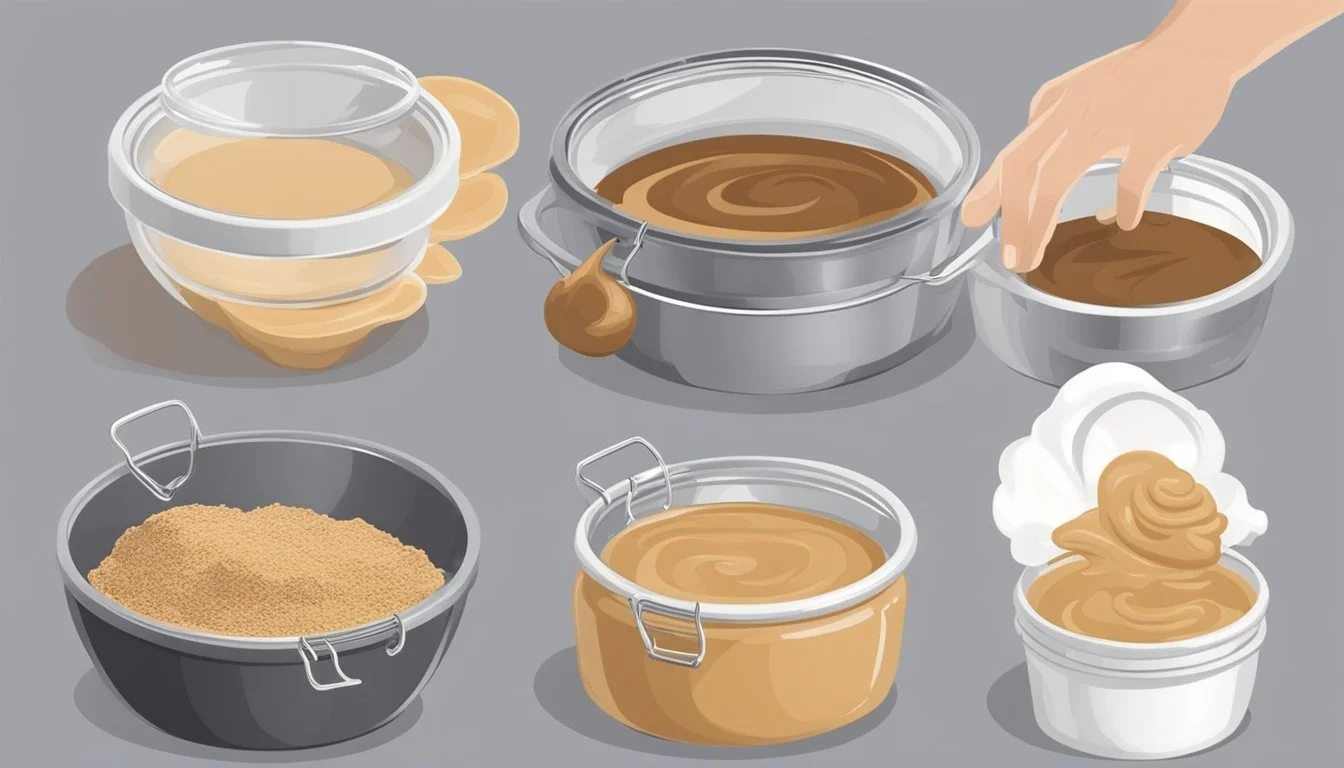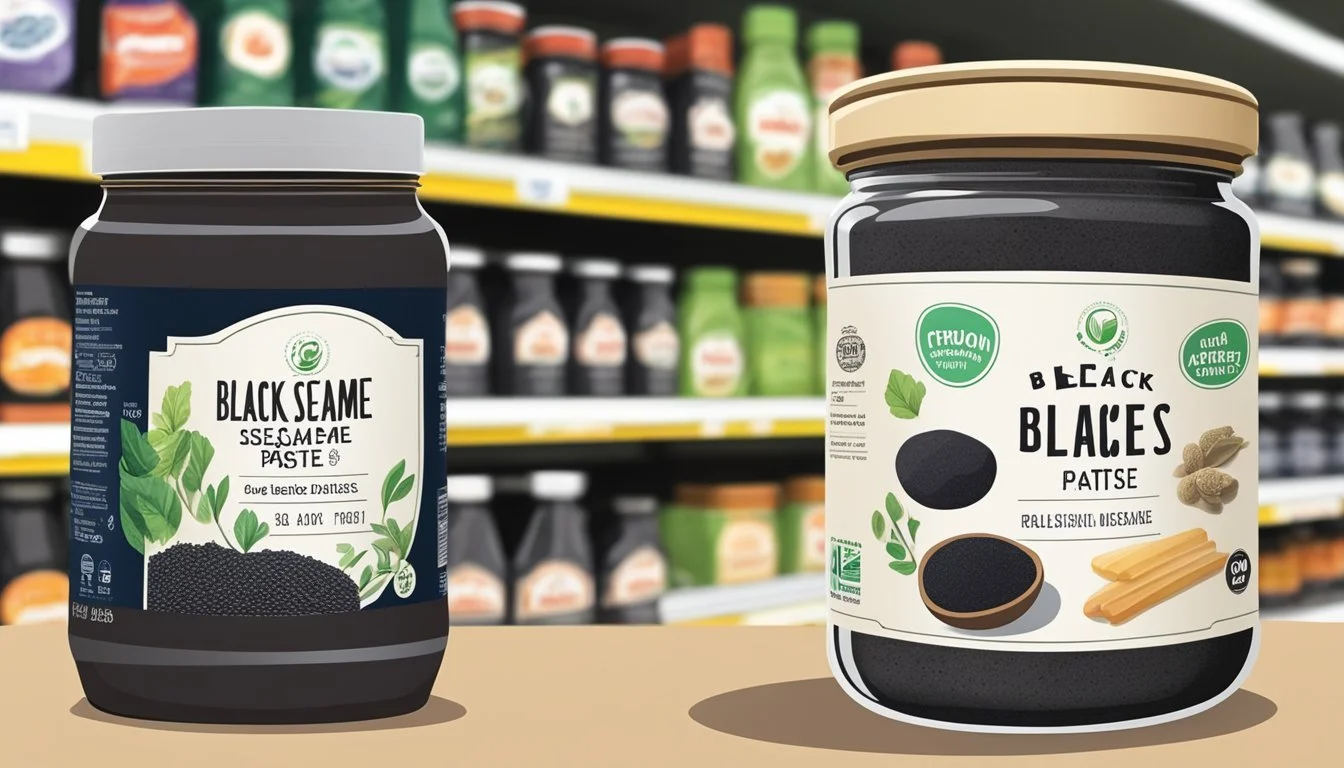Black Sesame Paste Substitutes
Top Alternatives for Every Recipe
When you find yourself in need of black sesame paste but don’t have it on hand, there are several excellent substitutes available that can provide similar flavors and textures. Tahini is one of the best substitutes for black sesame paste, offering a rich, nutty taste that pairs well in a variety of recipes. Made from hulled sesame seeds, tahini can easily replace black sesame paste in both savory and sweet dishes.
Another great option is almond butter. With its creamy consistency and mild flavor, almond butter can be a versatile alternative to black sesame paste. It’s especially suitable for those looking for a nutritious replacement as it’s packed with Vitamin E and antioxidants. Mixing almond butter with a bit of sesame oil can help mimic the unique taste and texture of black sesame paste more closely.
For a more homemade touch, consider creating your own blend using toasted sesame seeds and sesame oil. Grinding toasted sesame seeds and mixing them with sesame oil creates a smooth, rich paste that can substitute black sesame paste almost perfectly. This DIY method allows you to control the flavor intensity and consistency, making it a flexible and practical solution.
Understanding Black Sesame Paste
Black sesame paste, a staple in Asian cuisine, particularly in Chinese cuisine, is made from black sesame seeds. These seeds are ground into a smooth, rich paste that can be used in a variety of recipes.
The flavor of black sesame paste is nutty and slightly sweet, with a deep, earthy tone. This distinctive flavor makes it a popular ingredient in both savory dishes and desserts.
The texture of black sesame paste is usually thick, akin to natural peanut butter. It should be smooth but not too runny.
Key Uses
Savory Dishes:
Incorporated into sauces and dressings.
Added to soups and stir-fries.
Desserts:
Used in Asian desserts like black sesame ice cream.
Spread on toast or bread for a quick snack.
Health Benefits
Black sesame seeds are rich in nutrients, including:
Healthy fats
Proteins
Minerals such as calcium and iron
Their nutrient content makes black sesame paste a healthy addition to many meals.
Nutritional Profile of Black Sesame Paste
Black sesame paste is a nutrient-rich food, packed with essential vitamins and minerals.
Key Nutrients
Protein: Approximately 4-6 grams per ounce, supporting muscle growth and repair.
Dietary Fiber: Contributes to digestive health with around 4 grams per ounce.
Healthy Fats: Rich in mono- and polyunsaturated fats, beneficial for heart health.
Minerals
Calcium: Essential for bone health, providing around 88 mg per tablespoon.
Magnesium: Supports muscle and nerve function, offering about 32 mg per tablespoon.
Iron: Important for oxygen transport in the blood, with around 1.3 mg per tablespoon.
Zinc: Boosts the immune system, containing roughly 1 mg per tablespoon.
Phosphorus: Aids in the formation of bones and teeth, with approximately 56 mg per tablespoon.
Manganese: Plays a role in metabolism regulation, offering around 0.7 mg per tablespoon.
Selenium: Supports thyroid function, securing about 2.8 mcg per tablespoon.
Vitamins
Black sesame paste includes small amounts of B vitamins and vitamin E, which both contribute to energy metabolism and skin health.
Antioxidants
Black sesame seeds contain potent antioxidants, such as sesamin and sesamolin, which protect cells from oxidative damage.
Health Benefits
Regular consumption of black sesame paste can contribute to improved bone density, enhanced immune function, and better heart health due to its nutrient density and high antioxidant content.
Common Black Sesame Paste Applications
Black sesame paste is incredibly versatile and used in a variety of traditional and modern culinary contexts. It is valued for its rich, nutty flavor and smooth texture, making it a popular ingredient in both sweet and savory dishes.
Traditional Uses in Asian Cuisines
Black sesame paste is a staple in many Asian dishes. It is commonly incorporated into desserts such as mochi and sweet soups, offering a unique flavor profile that balances sweetness with a hint of bitterness.
In Japanese cuisine, black sesame paste is often used as a filling for rice cakes and pastries. Additionally, it is mixed into sauces and dressings for noodle dishes and vegetable stir-fries to enhance their taste.
In Chinese cuisine, black sesame paste can be found in dim sum and as a topping for dumplings. It also serves as a key ingredient in soups and stews, adding a rich, earthy depth to these dishes.
Modern Culinary Uses
In contemporary cooking, black sesame paste has found its way into a variety of non-traditional dishes. It's increasingly popular as a condiment in salads and dressings, where its unique flavor complements fresh vegetables and proteins.
Chefs also integrate black sesame paste into hummus, creating a new twist on the classic dip. It makes a compelling addition to smoothies and yogurt bowls due to its nutty flavor and nutritional benefits.
As a seasoning, black sesame paste can be added to stir-fries, enriching the dishes with its depth of flavor. It also serves as an innovative ingredient in sushi, where it can be used to create sauces or even as a replacement for traditional soy-based dips.
Homemade Black Sesame Paste Recipe
To make homemade black sesame paste, start by gathering black sesame seeds, salt, and sugar.
Ingredients:
1 cup black sesame seeds
2 tbsp sugar (optional)
A pinch of salt
Steps:
Toast the Seeds: Pour the black sesame seeds into a large skillet or pan over medium heat. As you toast, stir consistently for about 5 minutes until the seeds are aromatic and slightly toasted.
Grinding the Seeds: Transfer the toasted seeds to a food processor or high-powered blender. Blend until the seeds form a coarse, sandy texture.
Processing to Paste: Add the sugar and salt. Continue blending until the seeds release their oils, creating a smooth, thick paste. This can take several minutes.
Tips:
Ensure the seeds are hulled and roasted for a smoother texture.
Adjust the sweetness to your preference with more or less sugar.
For a traditional method, use a mortar and pestle. It requires more effort but delivers a finer texture.
Store the paste in an airtight container and refrigerate.
Substitutes for Black Sesame Paste
Finding the right substitute for black sesame paste can enhance your dishes without compromising flavor and texture. Here are some effective alternatives to try.
Nut and Seed-Based Alternatives
Tahini Paste
Tahini, made from ground sesame seeds, offers a similar texture and consistency to black sesame paste. It has a slightly nutty flavor that can complement a variety of dishes, from dressings to spreads.
Smooth Peanut Butter
Smooth peanut butter can act as a stand-in. To get closer to the flavor profile, mix a bit of sesame oil into the peanut butter. This blend works well in recipes where sesame paste isn't the star ingredient.
Sunflower Seed Butter
Sunflower seed butter provides a nutty taste without the use of tree nuts or peanuts. It serves as a good replacement, particularly for those sensitive to nuts, and can be used in desserts or savory dishes alike.
Almond Butter
Almond butter brings a slightly sweet and creamy flavor. It is versatile and can be incorporated into both sweet and savory recipes.
Nut-Free and Allergy-Conscious Options
Poppy Seeds
Poppy seeds offer a crunchy texture that can mimic sesame seeds when used as a topping. They can be ground into a paste to replace black sesame paste in baked goods and sauces.
Chia Seeds
Chia seeds are another good alternative. When ground and soaked, they form a gel-like consistency similar to black sesame paste. This substitute works well in smoothies and baked goods.
Pumpkin Seeds
Roasted pumpkin seeds can be ground into a smooth paste that serves as a suitable alternative. Their rich, nutty flavor can enhance both sweet and savory dishes.
Soy Butter
Soy butter provides a nutty flavor without any tree nut or peanut components. It is ideal for those with nut allergies and works well in various recipes that call for black sesame paste.
These substitutes ensure you can still enjoy the unique characteristics of black sesame paste even when it's not available.
Accompanying Ingredients and Flavor Pairings
Black sesame paste brings a deep, nutty flavor to a variety of dishes.
Sweet Pairings:
Sugar: Enhances the natural sweetness of black sesame.
Milk: Creamy texture complements the paste in desserts like ice cream and smoothies.
Butter: Great for adding richness to cakes, pastries, and muffins.
Savory Pairings:
Salt: Balances the paste’s nuttiness, especially in noodles and salad dressings.
Sesame Oil: Intensifies the nutty flavor, perfect for topping or garnish on breads.
Snacks and Bakes:
Granola Bars: Adds a unique taste to granola bars.
Cookies: Combines well with chocolate and vanilla for interesting cookie recipes.
These combinations create a blend of textures and flavors, making black sesame paste versatile in both sweet and savory dishes.
Selecting the Right Substitute for Your Recipe
When it comes to replacing black sesame paste, consider both the flavor and texture required by your dish. Black sesame paste typically offers a rich, nutty taste and smooth, almost creamy consistency.
Tahini
Tahini, made from ground sesame seeds, is the closest match in terms of texture and flavor. It works well for both savoury dishes and desserts in Middle Eastern cuisine. Use it in dressings, sauces, and even baking.
Peanut Butter
Peanut butter offers a similar texture and can be a good substitute, especially in desserts and baking. Its flavor profile is stronger and slightly sweeter, so it may alter the taste of your dish.
Almond Butter
For a milder flavor and smooth texture, almond butter is suitable. It can be used in a variety of dishes, from savoury to sweet. Almond butter works well in both Asian and Western dishes, including sauces and dressings.
Sunflower Seed Butter
Sunflower seed butter offers a nutty flavor and creamy texture. It's a versatile substitute, fitting well in savoury dressings and Asian cuisine. It's also useful for those with nut allergies.
Pumpkin Seed Butter
Pumpkin seed butter provides a unique flavor that's slightly earthy. It has a similar texture to black sesame paste and can be used in Asian-inspired dishes and sauces. It’s also a great option for garnishing.
Flax Seeds
When a nutty flavor is desired but seeds are preferred, ground flax seeds can be used. They add a different texture but work well in baking and savoury dishes.
Hemp Seeds
Hemp seeds can be a good garnish and can match the texture of sesame seeds. Their flavor is mild, making them suitable for a variety of dishes, including sauces and dressings.
Incorporating Substitutes in Various Cuisines
Tahitian Paste is a versatile substitute for black sesame paste. In Asian cuisine, it can be used in sauces and stir-fries. It adds a nutty flavor to dishes like noodle salads and dipping sauces.
Miso can be an excellent stand-in for black sesame paste in soups and stews. Its rich umami flavor enhances the overall depth of savory dishes. Middle Eastern cuisine often uses tahini in place of black sesame paste for dips and dressings.
Peanut Butter can also replace black sesame paste in desserts such as cookies and pastries. Its creamy texture and nutty flavor make it ideal for sweets that call for black sesame paste.
For a lighter option, flaxseed paste can work well in salads and as a garnish for soups. It provides a mild, earthy taste and is rich in nutrients.
Incorporating these substitutes allows for culinary creativity while maintaining flavor and texture in various dishes.
Cost and Availability of Substitutes
When considering substitutes for black sesame paste, tahini paste is a popular option. It is widely available in most grocery stores and health food shops. Typically, tahini tends to be moderately priced, making it an affordable alternative.
Hemp seeds serve as another substitute, though they can be more challenging to find in regular supermarkets. They are often stocked in specialty stores or can be ordered online. Hemp seeds are usually more expensive compared to other alternatives.
Poppy seeds provide a viable substitute for sesame seeds, offering a similar nutty flavor. Poppy seeds are easily found in grocery stores and are relatively inexpensive, providing a cost-effective alternative. They're typically available in small, affordable packets.
Flax seeds are another economical and widely available alternative. Found in most grocery and health food stores, they are rich in nutrients and usually priced reasonably.
For those seeking a substitute with a similar health profile, sunflower seed butter is a good alternative. Available in many grocery and health food stores, it is generally affordable and offers a texture akin to sesame paste.
Substitute Availability Cost Tahini Paste Easily available Moderate Hemp Seeds Hard to find Expensive Poppy Seeds Easily available Inexpensive Flax Seeds Easily available Inexpensive Sunflower Seed Butter Easily available Moderate
Considering these factors, one can select the most suitable substitute based on both cost and availability.









